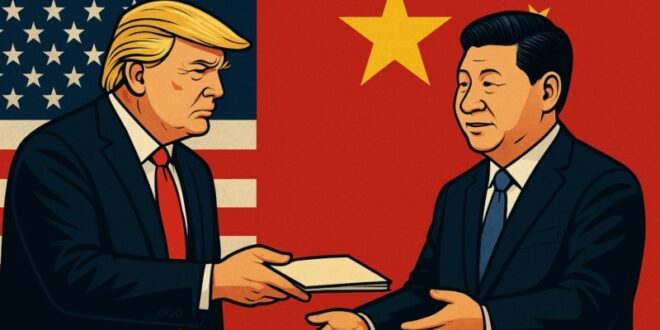Aaron Bartnick
In competing with China in global markets, the United States should not seek to create an imitation command-economy from scratch.
At an October 15 event promoting investment in the United States, Treasury Secretary Scott Bessent remarked: “When you are facing a nonmarket economy like China then you have to exercise industrial policies.” Public policy can absolutely help correct market shortcomings in areas affecting national security. But smart economic security policy should leverage and double down on American advantages in innovation, open capital markets, and the rule of law rather than replacing them with Chinese command-and-control tactics that the United States cannot fully replicate. Winning the US-China economic competition requires competing on our terms, not embracing China’s undemocratic practices ourselves.
The Trump administration has already taken unprecedented steps to insert itself into the private sector. It has taken a “golden share” in US Steel and equity positions in companies ranging from computing giant Intel to small critical mineral operations. It has deployed tariffs at rates not seen in a century, demanded kickbacks on foreign semiconductor sales, and tried to pressure the Federal Reserve to paper over the resulting disruption with lower interest rates.
Yet Bessent has now pledged to go further, taking not only equity stakes but also inserting the government into the governance and day-to-day management of firms in seven sectors the administration deems strategic. While these sectors have yet to be named, we can surmise they include industries where the administration has already shown interest—semiconductors, critical minerals, steel—as well as sectors such as shipbuilding, aerospace, defense, and pharmaceuticals.
Dependence on our greatest rival in these national security-relevant industries is a real problem, and some of Bessent’s proposed responses should help. Price floors and forward purchase agreements can help establish baseline demand that instills confidence to make necessary investments in overlooked industries, and can attract the private capital necessary to make these industries self-sufficient over the long term. We know these tools work: during the COVID-19 pandemic, advance purchase commitments helped bring vaccines to market in record time without the government taking control of pharmaceutical companies.
Stockpiling, as the Trump administration has proposed for critical minerals, can also be effective. But the Defense Production Act already gives the government wide latitude to drive surge production of national security-related products, and the Strategic Petroleum Reserve has lasted for 50 years without the US government needing to nationalize ExxonMobil or Chevron.
Related Articles
The trouble starts when market-shaping gives way to firm-running. History has shown convincingly that, while government can be exceptionally effective in setting the conditions for competition, it consistently underperforms market forces in running particular industries or firms. The US government is no exception, nor is the Chinese Communist Party. While China has achieved global dominance in industries like electric vehicles and solar panels, it has also precipitated a massive housing crash that severely eroded household wealth, triggered a crisis of confidence among consumers, and has become the single largest drag on the country’s economic growth.
And last year, US private companies achieved more than double the profit margins of their Chinese state-owned counterparts while taking on significantly less debt. Just this month, the Nobel Prize in economics was awarded to researchers who have shown that innovation and technological progress, not state direction and production booms, drive economic progress.
Bessent and the Trump administration have overestimated the power of China’s economic statecraft toolkit and our ability to replicate it, while underestimating the value of our own tools and national competitive advantage.
Instead of trying to insert bureaucrats into boardrooms, the administration should seek to spur demand through proven tools like price floors and advance purchase agreements and steer market forces toward sectors where national security requirements outpace the natural allocation of capital. And for industries where production shortages exist across the Western world, like critical minerals, like-minded allies can compound these tools’ power by creating buyers’ clubs with mutual certification so allied output qualifies for US procurement.
These demand-side levers can help us unleash American innovation and competition, catch up to China, and eventually create the strategic stockpiles necessary to weather any future supply shocks by our adversaries. These tools are also scalable, creating sector-wide conditions for success rather than picking individual winners and losers for individual awards and government control.
Washington will not out‑command Beijing, and it should not try. We will win this economic competition by doubling down on the competitive advantages that helped us build the world’s most dynamic economy: setting clear rules, letting competitive markets allocate capital and drive innovation, and using policy tools for narrowly-tailored interventions that apply equally across firms. We should strive to beat China, not become it.
About the Author: Aaron Bartnick
Aaron Bartnick is a Global Fellow at Columbia University’s Center on Global Energy Policy and previously served as Assistant Director for Technology Security and Governance in the White House Office of Science and Technology Policy.
Image: Photo Agency / Shutterstock.com.
Related Articles
 Geostrategic Media Political Commentary, Analysis, Security, Defense
Geostrategic Media Political Commentary, Analysis, Security, Defense






